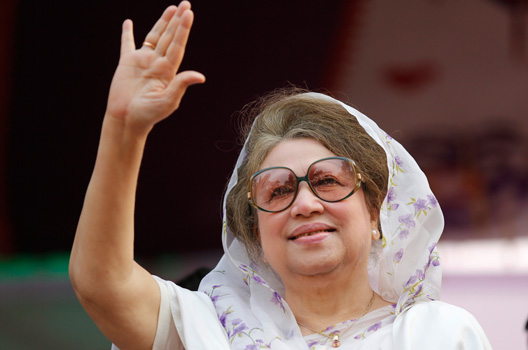 A decision by a court in Bangladesh to issue an arrest warrant for Khaleda Zia on February 25 is likely to escalate tensions between the opposition leader’s supporters and Prime Minister Sheikh Hasina’s government.
A decision by a court in Bangladesh to issue an arrest warrant for Khaleda Zia on February 25 is likely to escalate tensions between the opposition leader’s supporters and Prime Minister Sheikh Hasina’s government.
“We don’t know how this will play out or whether it will precipitate a deeper crisis, but one thing is for sure and that is this is a direction in which you do not want things to go,” said Bharath Gopalaswamy, Acting Director of the Atlantic Council’s South Asia Center.
“If you want to defuse the political crisis and get the parties to the table you have to work behind the scenes. Issuing a public arrest warrant certainly doesn’t help,” he added.
The arrest warrant was issued after Zia, a former Prime Minister, failed to appear in court for the fourth time to face corruption charges. Zia, who leads the Bangladesh Nationalist Party (BNP), maintains that the charge that she was involved in embezzlement during her tenure in office is politically motivated. Her eldest son, Tarique Rahman, has also been indicted.
Clashes erupted between government and opposition groups on January 5, the anniversary of the disputed 2014 elections, which the BNP boycotted. More than one hundred people have reportedly died in the violence since January.
Hasina and Zia, who have been at loggerheads for decades, are often referred to as “Battling Begums.” Neither has shown a willingness to take steps to de-escalate the current crisis.
The opposition has imposed a transportation blockade across Bangladesh in a campaign aimed at forcing Hasina to resign and face new elections. The next elections are due in 2019. Zia has said she wants to prevent Hasina and her Awami League party from imposing “one-party rule with the trappings of democracy.”
A defiant Hasina last week told Parliament: “We must defeat the terrorists.”
The Obama administration and the United Nations have expressed concern about the political violence.
“We deplore the unconscionable attacks including bus burnings, throwing incendiary devices, and train derailments that have killed and wounded innocent victims. We condemn in the strongest terms the use of violence for political objectives,” Marie Harf, the State Department’s Deputy Spokesperson, said in a statement on February 5.
All Bangladeshis must have the ability to express their views peacefully, the government in Dhaka should “provide the necessary space for peaceful political activity,” and all parties must refrain from violence, she added.
While strong statements are all well and good, the Obama administration should do more, said Gopalaswamy.
“The US should use multilateral organizations to put pressure on the Bangladeshi government in public, but in private we also have to let them know that this is a situation that cannot continue,” he added.
UN Secretary-General Ban Ki-moon recently wrote to Hasina and Zia urging them to end the violence and engage in a constructive dialogue. Ban asked both sides to work with his special envoy, Assistant Secretary-General Oscar Fernández Taranco.
Tensions between the government and the opposition had already been running high following the Hasina government’s decision to set up a tribunal to try those accused of committing rape and murder during Bangladesh’s war of independence from Pakistan in 1971. So far, nine members of the Jamaat-e-Islami, an Islamist party aligned with the BNP, have been convicted.
Ashish Kumar Sen is an editor with the Atlantic Council.
Image: A court in Bangladesh on February 25 issued an arrest warrant for Bangladesh Nationalist Party (BNP) Chairperson Khaleda Zia. The arrest warrant heightens tensions between Khaleda, who is the leader of the opposition, and Prime Minister Sheikh Hasina's government. (REUTERS/Andrew Biraj)
